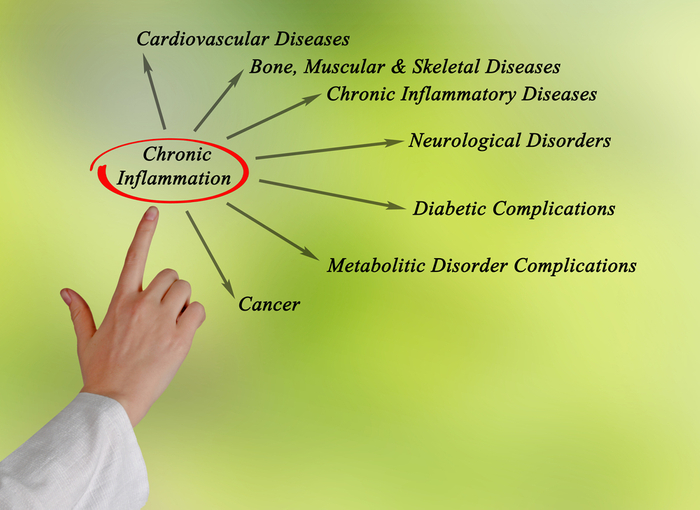When you think of inflammation, you probably envision a sore throat or a sprained ankle — something swollen and red. There is another type of inflammation, though, that often goes undetected: chronic inflammation.
Lifestyle Programs Tailored to Your Unique Genetic Profile

Chronic Inflammation

Chronic inflammation is what happens when the immune system is triggered to dispatch white blood cells unnecessarily. When these cells have nothing to attack, they can turn on the body’s internal organs.
This can result in diseases such as cancer, cardiovascular disease, diabetes, Alzheimer’s or cognitive decline, depression, and more.
While none of us want to think about these diseases, addressing the possibility that we could be at risk is critical to fighting them off.
How Do You Know if you Have Chronic Inflammation?
There are many blood test markers to determine whether you are in a state of inflammation. Some of these markers your physician will regularly test for, but not all.
Be on the lookout for these five signs of chronic, low-level inflammation, which are often mistaken for signs of aging:
- Constant fatigue
- Depression or brain fog
- Gas, bloating, diarrhea, or constipation
- Allergies and infections
- General aches and pains for no apparent reason
How to Treat Chronic Inflammation
If you suspect you are or may be dealing with chronic inflammation, there are lifestyle changes you can make that will make a difference!
As someone who studies the human genome and how we can turn certain genes on and off, I can tell you that these changes make all the difference in your overall health and chronic inflammation.
Exercise
Our culture places a huge emphasis in exercise to look better, but it is actually an essential piece of our overall health. Exercise is a necessity for disease prevention and psychologic health.
Look at exercise as a way to regenerate your system, fighting off potential diseases and ailments. There are many different types of exercise including low slow endurance, high intensity interval training, and resistance training.
The type of exercise that will work best for you is dependent on your genetic make-up. Genetic mapping and analysis can provide the answer.
Diet
Ever wonder why a friend or family member can eat anything and appear to suffer zero consequence? That’s because some bodies are better able to metabolize fats, proteins, and carbohydrates. Each of us has a different genetic make-up that determines what happens when we indulge in certain foods.
As mentioned before, however, this goes further than appearance. Keeping our weight down does not guarantee overall health. Proper food choices are critical.
Ideal foods can vary from person to person because some have intolerances to certain foods such as gluten, dairy, nuts and nut oils, and more. These intolerances going unnoticed can lead to chronic inflammation.
Supplements
Many supplements have been tested and proven to have positive effects on different inflammatory factors, but it’s important to know which is the right supplement for you.
An analysis of your genome can easily determine which supplements are right for you based on areas where your body does not adequately absorb, transport, or create key enzymes to facilitate the body’s processes.
Here is a list of potent supplements for inflammation:
- Fish oil
- Vitamin K
- Catechin, epigallocatechin gallate (EGCG)
- Berberine
- Curcumin
- Magnesium
- Fructooligosaccharides
- Quercetin
- Nicotinamide Riboside
- Resveratrol
- Bacopa monnieri
Sleep/Stress Relief
Often easier said than done, adequate sleep is necessary to replenish and repair the body and mind.
Developing good sleep habits is critical to reversing chronic inflammation. Managing stress is also important through acts such as positive affirmations, visualizations, mindfulness, deep breathing, and meditation.
Final Thoughts
Knowing what you are susceptible to from a disease standpoint can be scary, but the truth is that you can do something about it relatively easily. If you’re interested in walking through an analysis of your genes and developing and fitness and lifestyle plan around those genes, reach out to me to schedule a consultation.
